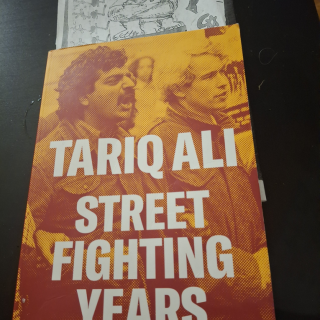Irene (Rebecca Marder) is a young Jewish woman leading a vibrant life, in the summer of 1942 in Paris. Her family watches her as she grows and discovers the world around her, making new friends, finding new love, and her passion for theater. Irene wants to become an actress and her youthful days go by without a care in the world.
At the very beginning of the film, one may wonder: What's this movie about? And it only takes one line, “You've to put the 'Jew' stamp on the papers” to understand where you are. And as everyone knows what happened in 1942, there’s really no need to add more by showing a German soldier or a German flag.
It seems that this desire for purity is also linked to Irene’s point of view. She’s this radiant girl, caught up in the impulses of her age who refuses to see too much of the looming darkness. Irene doesn’t want to see what’s going on. She can sense the monster lurking in the shadows. Her blackouts betray what she knows but is trying to expel. It’s her body speaking for her. She manifests the distress of the time through her fainting fits. So she knows what’s going on, but the film also wants this character to be faithful to her age. When you’re eighteen, even when faced to terrifying news, you can’t wait to go to your acting class, and meet your boyfriend, you refuse to be locked in by what bothers you, you’re living your life, first and foremost.
Eighteen is an age when everything is possible. You become attached to this life force. This moment when one comes out of childhood and becomes a young adult, because it’s a meaningful age, filled with everything: the first desires, the will to leave home, the fear to leave childhood, and the discovery of the person we’re going to become.
The scene where Irene rides a bicycle is symbolic, she goes fast, nothing stops her, and she could go to the end of the world. She ignores the tragic turn her life is about to take; she’s just following this urge for life that she has. In the film the mother is absent, and we’re not given any answer. This unexplained absence is one of the mysteries in the film. If the mother is not present, it’s obvious that she shouldn’t be mentioned, because this absence speaks for itself. This makes Irene a very responsible 18-year-old girl; she’s very mature for her age. This also creates an immediate empathy with the characters, with the grandmother Marceline (Françoise Widhoff), with the father Gilbert (Jean Chevalier) who lost his wife, with Irene who replaces her mother in running the household, and with the brother Igor (Anthony Bajon) who's the most vulnerable child.
In the scene where we see Marceline and Vivian (India Hair) sitting on a bed, Vivian is very contained and Marceline quite wild. So yes, initially, we think that Marceline and André (André Marcon) are a couple, that they’re the parents of Irene and her brother Igor, then a single word is enough to make people understand that they aren’t. It creates a gap in this family that's both tragic and mysterious.
The camera only settles when Irene is with the adults, because an adult is more mature, more poised. But we've to experience Irene’s passion. It propels the story forward and makes us want to follow her. She slams the door, runs down the stairs. We want her to always be in the same momentum so that, as the realities of her time close in on her, her urge for life grabs us by the throat.
André does not want to rock the boat. He obeys the laws, even the most appalling, while Marceline doesn’t. This poses a crucial question, which was also that of the Jewish Councils: should one resist, with the risks that this entails, or obey, in the hope that things will settle down? Marceline says in the film, “If you do that, if you go to the town hall, I will jump out the window!” In doing so, she saves the family. Going to the town hall at the time is like throwing yourself in the mouth of the wolf.
The film is inspired by The Diary of Anne Frank. Today, with seventy years of hindsight, we know history, and the tragic fate of Anne Frank; but when she wrote her diary, she didn’t know what the end would be, and would never get to write it. In the first sequences of "A Radiant Girl," we do not realize at all that it takes place in the 40s. What’s striking about "A Radiant Girl" is how austere it is in its representation of the 1940s. It’s very uncluttered, you don’t see the SS, Nazi flags, raids, and yet, you can feel it all.
The tone of the film is even more reminiscent of “The Journal of Hélène Berr,” which is included in the end credits. Hélène Berr’s life force and writing impressed us. Her youth makes it possible to measure even more acutely the horror of what’s going to happen. Hélène Berr makes music, she talks about nature, and she has a boyfriend. The idea of the film is to show that this family is made up of people like everyone else, that what happens to them could happen tomorrow, or in fifty years. In some ways the film provides too much of a temporal context. For example, the music in the soundtrack is from all eras. The girls are not overly styled or their hair done in the style of the 1940s.
The film features very keen observations on Jewishness, such as this scene during Shabbat dinner where everyone makes the rituals their own. Shabbat or pessah is cultural rather than religious, like when we celebrate Christmas. This culture will never leave us, but everyone can experience it in his or her own way. This prevents us from living. Some people are more courageous and are able to put fear away. Today we know what the Shoah was like, but we've to place ourselves in the minds of those who lived at the time and didn’t know. They lived normally, yet at the same time, they could no longer live normally. There's a dilemma between not wanting to believe that the worst could happen, and not having any other choice than believe it.
Opens at Gateway
Fri, Feb 24
Sat, Feb 25
Sun, Feb 26
Thu, Mar 2
4:15 pm








